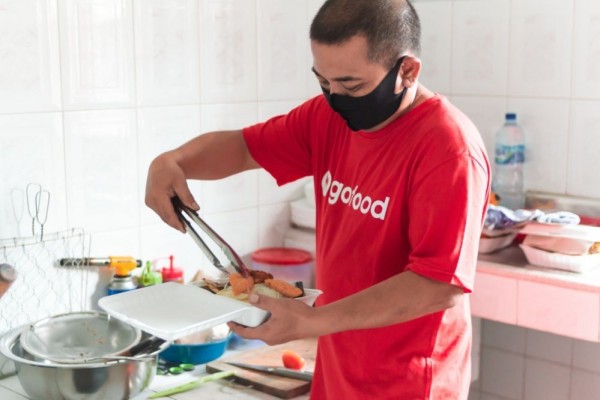Gojek Contributed Rp7 Trillion to Medan’s GDP Last Year
DEPOK – Tuesday, (22/09/2020) sumut.idntimes.com published an article about the results of research conducted by the Demography Institute, FEB UI, in Medan city. The article, entitled “In Medan, Gojek Contributed Rp7 Trillion Last Year“, appeared in its Economy section. Below is the complete article.
Medan, IDN Times – The Demography Institute of the Faculty of Economics and Business, Universitas Indonesia (LD FEB UI) said that Gojek partners contributed Rp7 trillion to Medan City’s regional gross domestic product (RGDP) in 2019, accounting for 3.1 percent of Medan’s RGDP. When measured using the value added calculation, Gojek contributed Rp2,5 trillion to Medan’s economy in 2019.
The research was part of the research on “The Role of Gojek’s Digital Ecosystem in Indonesia’s Economy before and during the COVID-19 pandemic.” The research found that the turnover of MSMEs who are GoFood, GoSend, and GoPay partners increased by 36 percent, 3 percent and 7 percent in 2019. Meanwhile, 78 percent of MSMEs who are GoFood partners reported an increase in transaction volume and 98 percent of them acquired new clients.
- Gojek accelerates MSME digitalization and financial inclusion
Dr. Paksi C.K Walandouw, Deputy Head of the Demography Institute, FEB UI, said the research shows that in normal times before the pandemic, digital economy such as Gojek had great potential to drive regional economies such as in Medan by increasing the turnover of MSMEs who are GoFood and GoPay partners, and GoSend’s social sellers. Digital economy plays an increasingly crucial role in driving the growth of its MSME partners as the economy recovers from the pandemic.
“Gojek also accelerates MSME digitalization and financial inclusion. Data show that GoFood was the pioneer of MSME digitalization, with 95 percent of MSMEs have gone digital and 90% of them using non-cash payment system. Meanwhile, 42 percent of GoRide partners and 43 percent of GoCar partners routinely save their money after they joined Gojek,” he said.
- Gojek has domino effect on other sectors in Medan
Gojek benefits MSMEs within and outside its ecosystem in Medan such as produce suppliers and automotive repair shops whose turnover has increased by 30%.
Paksi added that Gojek has a domino effect in other sectors in Medan. Gojek’s multiplier effect in or indirect contribution to Medan’s RGDP in 2019 stood at Rp 943 billion. The figure was calculated based on the income of MSMEs outside Gojek’s ecosystem (such as the automotive repair shops that provide services for partner drivers or market traders who sell produce to GoFood partners) after Gojek started operations in Medan.
In addition to examining the impact of Gojek’s ecosystem on Medan in 2019, the research also showed that 93 percent of GoRide’s and GoCar’s partner drivers in Medan received at least a type of social assistance from Gojek during the COVID-19 pandemic. Most of the partner drivers who received the aid (80 percent) expressed appreciation for Gojek’s assistance.
- 37.4 percent of partner drivers give social assistance to relatives to show care for others
Dr. Alfindra Primaldhi, LD FEB UI researcher, said that although 51.9 percent of partner drivers were concerned about COVID-19, more than one-third of them (37.4 percent) still showed care for others and gave social assistance to relatives, people in need, religious bodies and peer drivers.
“In addition, most of the partner drivers are confident that by continuing their partnership with Gojek they will be able to earn the same amount of income as before the pandemic (67 percent) and will be able to provide for their family (71 percent). Good relations with Gojek are also reflected in the number of partner drivers (86 percent) who said they will continue the partnership with Gojek.
Hubungan yang baik dengan Gojek juga tercermin dengan 86 persen mitra driver yang menyatakan akan seterusnya melanjutkan kemitraan dengan Gojek,” ungkapnya.
- Gojek’s partners contribute Rp104.6 trillion to Indonesia’s economy
At the national level, Gojek’s partners for five services (GoFood, GoPay, GoSend, GoCar and GoRide) contributed Rp104.6 trillion to Indonesia’s economy in 2019 before the pandemic broke out, the research found.
When measured based on the GDP calculation, the production value of Gojek’s digital ecosystem in 2019 was equivalent to 1 percent of Indonesia’s GDP.
LD FEB UI’s research was conducted in several areas in Indonesia using the quantitative method through face-to-face interviews to assess Gojek’s contribution in 2019 (Medan city, N = 652).
During the COVID-19 pandemic, the research was conducted online in the same areas from May to July 2020 (Medan city, N = 3452). Respondents were selected at random from Gojek’s database of active partners.
The sample represented the population of GoCar and GoRide’s partner drivers; GoFood and GoPay’s MSME partners; GoSend’s social sellers. For MSMEs outside Gojek’s ecosystem (repair shops, market traders), the research was conducted using thepurposive sampling method. The research is one of the large-scale studies on Indonesia’s digital economy during the pandemic.
(lem)

